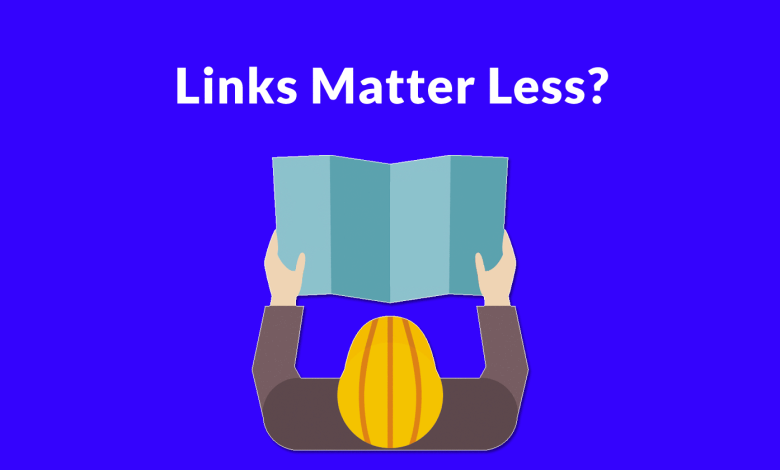
A colleague approached me about legitimate link building. He sought strategies that were results-oriented, scalable, and not considered blackhat, nor the unrealistic “build content and they will come” approach. Reflecting on his question that afternoon, I realized that links might hold different significance for SEO now compared to the past.
### Googler Confirms Links Don’t Always Help
In a recent Reddit AMA, Google’s John Mueller openly stated that links don’t always help and may not be the most efficient way to promote a site.
> “SEOs often focus on links too much, it doesn’t always help their sites in the long run or is probably not the most efficient thing to do to promote a website.”
### Links Don’t Count the Same as They Used to
Here are my observations on the current state of links, backed by various research and patents. It seems there are at least three ways links influence rankings.
#### 1. Validating Links
Some links help get your site crawled and pass on a little PageRank. Accumulate enough of these, and they serve as validation that your site isn’t a bad actor online. These are what I call Links for Inclusion and Validating Links. According to my research on the Penguin algorithm, Google is building at least two link graphs: one excluding spammy pages and one including non-spammy ones. This means you must have links from reputable sites to be considered for ranking. This concept is known as the Reduced Link Graph, which excludes sites considered bad actors.
A Google patent from 2006 mentions a reduced link graph as part of a link analysis algorithm.
> “In a variation on this embodiment, the links associated with the computed shortest distances constitute a reduced link-graph.”
> “A Reduced Link-Graph
> Note that the links participating in the k shortest paths from the seeds to the pages constitute a sub-graph that includes all the links that are “flow” ranked from the seeds.”
The notion of “flow ranked” highlights links from high-quality sites directing to relevant pages. This underscores the importance of links that aid ranking and inclusion versus those that do not.
#### 2. Links that Help a Site Rank
Assuming the existence of a reduced link graph, it becomes evident that some links will help a site rank, while others aid in getting the site crawled and included for ranking consideration. And some links just don’t help. There exists a theory called Site Authority suggesting certain sites possess Authority, and linking from these sites assists in ranking. However, Google has denied the existence of a domain authority metric.
Let’s dismiss the notion of an authority metric and proceed with Google’s statement that it isn’t real. It’s important to note that links from popular news sites don’t necessarily contribute to rankings. This is evident from the 2017 decision by outlets like Forbes and Huffington Post to apply no-follows to their outbound links without impacting SEO rankings.
In essence, some links boost rankings, some do nothing, and some include your pages in the reduced link graph for ranking contention.
#### 3. SERPs are Not a List Ordered by Links
The third impact links have on rankings is their non-impact on rankings. Google functions as a popularity engine. It ranks pages that best satisfy users at the top, based on user intent—what users mean and expect when typing their queries.
Google prioritizes ranking sites that satisfy the majority over individual personalization. For instance, if most users searching for “Jaguar” expect results about the car, that’s what Google will rank first, even if there are more links pointing to articles about the animal.
Thus, user intent can trump link signals. Links no longer solely determine who tops the SERPs. Sometimes, even with more or better links, a site won’t rank because rankings aren’t based solely on an arms race of links.
### Link Building May Need to be Reconsidered
The process of link building might need reevaluation. Consider this timeline of link building:
– Initially, ranking was about obtaining the most links.
– It evolved to obtaining links with keyword-relevant anchor text.
– Then, obtaining links from relevant pages without unnatural patterns.
– Now, it’s about links from relevant web pages and anchor text.
– Anchor text became less significant.
– Page content linking and linked-to content matter more.
### Link Building in 2018?
My colleague expressed frustration over unreliable online link-building information.
> “Everything I find online is either 2006 blackhat stuff or unhelpful ‘build good content and they will come’ stuff.”
#### History of How/Why Links Got Whittled Away
Old link building strategies once worked until SEOs scaled them. For example, directory submissions were acceptable until SEOs manipulated them by creating directories and purchasing links. Similarly, link trading escalated until Google identified unnatural patterns and penalized them.
The same fate befell guest posting, which once forged media relationships but now has less significance.
### Do Links Matter Less?
I believe link building has passed its peak of dominance. Links remain crucial but less so than before. Instead of obsessing over anchor text like it’s 2006, it’s more productive to focus on your audience and acquire links or citations from those pages. Any page likely to purchase your product or need your service is a good place to be recommended from.
Some may point to competitors using spammy techniques, but it’s possible those aren’t the driving force behind rankings. Google often discounts poor links, ensuring that those links don’t aid, but whatever is good about the site does.
That’s why I believe links are mattering differently. They still matter, but not as they once did.


